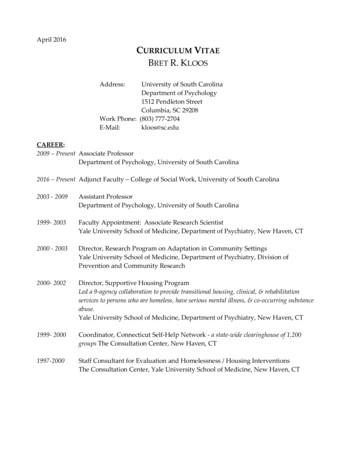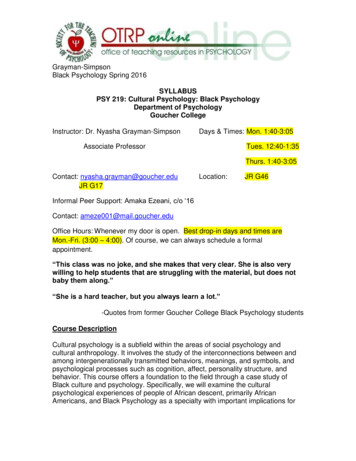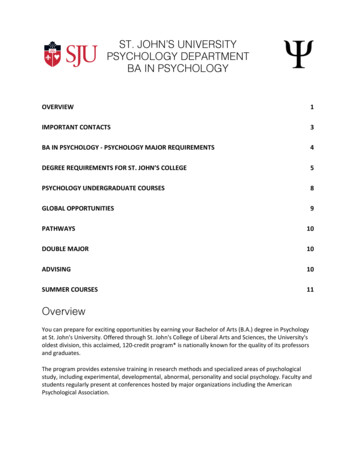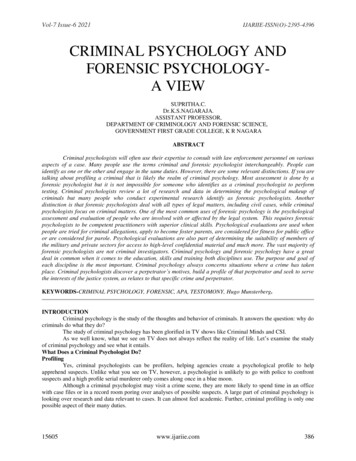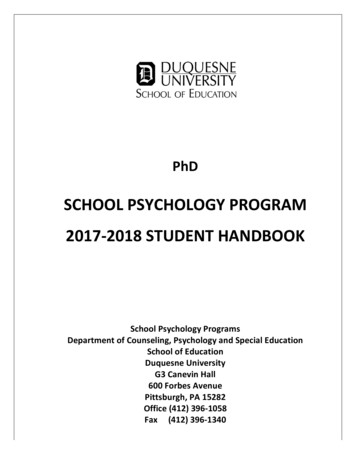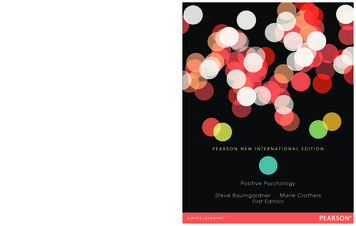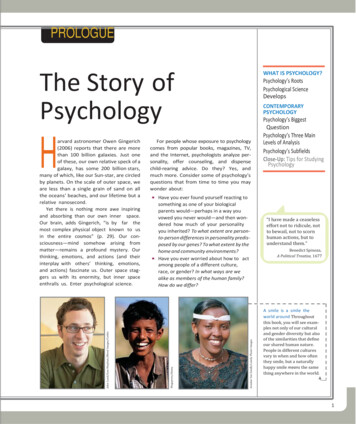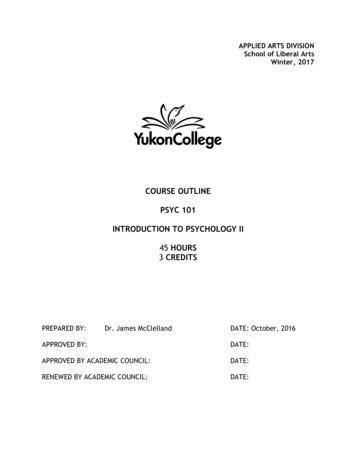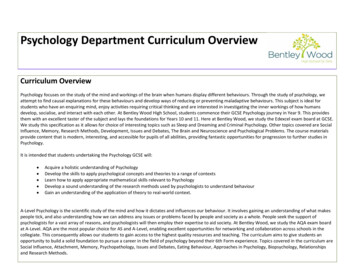
Transcription
Psychology Department Curriculum OverviewCurriculum OverviewPsychology focuses on the study of the mind and workings of the brain when humans display different behaviours. Through the study of psychology, weattempt to find causal explanations for these behaviours and develop ways of reducing or preventing maladaptive behaviours. This subject is ideal forstudents who have an enquiring mind, enjoy activities requiring critical thinking and are interested in investigating the inner workings of how humansdevelop, socialise, and interact with each other. At Bentley Wood High School, students commence their GCSE Psychology journey in Year 9. This providesthem with an excellent taster of the subject and lays the foundations for Years 10 and 11. Here at Bentley Wood, we study the Edexcel exam board at GCSE.We study this specification as it allows for choice of interesting topics such as Sleep and Dreaming and Criminal Psychology. Other topics covered are SocialInfluence, Memory, Research Methods, Development, Issues and Debates, The Brain and Neuroscience and Psychological Problems. The course materialsprovide content that is modern, interesting, and accessible for pupils of all abilities, providing fantastic opportunities for progression to further studies inPsychology.It is intended that students undertaking the Psychology GCSE will: Acquire a holistic understanding of PsychologyDevelop the skills to apply psychological concepts and theories to a range of contextsLearn how to apply appropriate mathematical skills relevant to PsychologyDevelop a sound understanding of the research methods used by psychologists to understand behaviourGain an understanding of the application of theory to real-world context.A-Level Psychology is the scientific study of the mind and how it dictates and influences our behaviour. It involves gaining an understanding of what makespeople tick, and also understanding how we can address any issues or problems faced by people and society as a whole. People seek the support ofpsychologists for a vast array of reasons, and psychologists will then employ their expertise to aid society. At Bentley Wood, we study the AQA exam boardat A-Level. AQA are the most popular choice for AS and A-Level, enabling excellent opportunities for networking and collaboration across schools in thecollegiate. This consequently allows our students to gain access to the highest quality resources and teaching. The curriculum aims to give students anopportunity to build a solid foundation to pursue a career in the field of psychology beyond their 6th Form experience. Topics covered in the curriculum areSocial Influence, Attachment, Memory, Psychopathology, Issues and Debates, Eating Behaviour, Approaches in Psychology, Biopsychology, Relationshipsand Research Methods.
Year 9 It is intended that students undertaking the Psychology A-level will:Develop essential knowledge and understanding of different areas of Psychology and how they relate to each otherMaster and showcase a deep appreciation of the skills, knowledge and understanding of scientific methodsGain competence and confidence in a variety of practical, mathematical and problem-solving skillsNurture their interest in and enthusiasm for the subject, including developing an interest in further study and careers associated with thesubjectUnderstand how society makes decisions about scientific issues and how the sciences contribute to the success of the economy and society.Autumn 1Autumn 2Spring 1Topic: Social InfluenceIntroducing students toSocial Influence and thedefinition of Psychologyand the study of humanbehaviour. Key terms r effect Factors affectingbystanderintervention:personal andsituational Conformity tomajority influence Factors affectingconformity tomajority influence:personality and thesituation Obedience toauthority Factors affectingobedience toTopic: Social Influence Crowd behaviour:pro and anti-socialbehaviour Preventing blindobedience Piliavin et al (1969)study: bystanderbehaviour Haney, Banks andZimbardo (1973)study: conformity tosocial roles Issues and Debatesapplication to SocialInfluenceTopic: ResearchMethods Experimentaldesigns:independentgroups, matchedpairs, repeatedmeasures Nonexperimentalmethods ions, casestudies,observationsTopic: MemoryThis topic feeds intothe cognitiveapproach inPsychology,allowing students todeepen theirholisticunderstanding ofthe subject.Topic: ResearchMethods Hypotheses: nulland experimental Sampling: randomand opportunity Sampling: stratifiedand volunteerSpring 2Topic: MemorySummer 1Topic: CriminalPsychologyCriminal Psychologyof memoryallows students to(Atkinson anddraw on the realShiffrin, 1968)world and make links Bartlett (1932):to the media.War of the Ghosts Operantstudyconditioning Peterson and(Skinner, 1948)Peterson (1939): Social LearningDuration of STMTheory (Bandura,study1977) Issues and BiologicalDebates:explanations ofReductionism vs.criminalityHolism(Eysenck, 1964) Exam Recidivism: effectsPractice/Consolidatof punishmention Feedback onassessment Multi-store modelSummer 2Issues and Debatesenables students todevelop anunderstanding of theinter-relationshipsbetween the coreareas of Psychologyand the differingperspectives thatexist within theseareas. Issues andDebates Exam Practice andPreparation (9marker practice)
Autumn 1authority: personalityand the situationResearch Methods isdesigned to interleaveto support theevaluation of keystudies in terms ofmethodology andethics.Topic: ResearchMethods Identifyingindependent,dependent andextraneous variables Ethical issues anddealing with them:informed consent,deception, right towithdraw,confidentiality,deception, protectionof participants Experimentalmethods ofinvestigation – Lab,Field and NaturalExperimentsAutumn 2Spring 1 Exam Structure andPractice/Consolidation Feedback onassessmentprocess ofmemory andinformationprocessing Amnesia:retrograde andanterograde Theory ofReconstructiveMemory (Bartlett,1932)Spring 2Summer 1Summer 2
Year 10Autumn 1Autumn 2Spring 1Spring 2Topic: CriminalPsychology Treatments for crime:token economy andanger-management Bandura, Ross andRoss study (1961):Imitation ofaggressive rolemodels Charlton et al (2000):Effects of TV onplayground behaviour Revision andconsolidationTopic: ResearchMethods Types of data:qualitative andquantitative;primary andsecondary Issues and Debates:application ofethical issues topsychologicalresearch Revision/consolidation Research Methodsproject: conductingand presentingpsychologicalresearchTopic: Development Piaget andeducation Piaget’s theory ofcognitivedevelopment Piaget andInhelder (1956)study: Threemountains task Dweck’s mindsettheory Willingham’slearning theory Gunderson et al(2013) study:parent praiseTopic: Development Issues andDebates: theoriesof moraldevelopment Revision/consolidation Assessment andfeedbackTopic: ResearchMethods Reliability andValidity Data Analysis:arithmetic andnumericalcomputation Descriptive statistics Representing andinterpreting dataTopic: DevelopmentThis topic furtherdevelops studentsunderstanding of therole of brainstructures in learningand development. Italso provides studentswith an opportunity toapply their knowledgeof Psychology to thefield of education. Early BrainDevelopment Piaget’s stages ofcognitivedevelopmentSummer 1Summer 2Topic: Development Issues and Damasio (1994)Debatesstudy: Phineas Gage Exam Practice and Sperry (1968)Preparation (9study: Split-brainmarker practice)research Issues andDebates: Changesin Psychology overtimeTopic: Brain and Revision/consolidaNeuropsychologytionThis topic is designed Assessment andto enable students tofeedbackdevelop anunderstanding andappreciation of thescientific nature ofPsychology, linking totopics such asBiology. Structure andfunction of thebrain Lateralisation offunction in thehemispheres Central NervousSystem: neuronsand synapses Neurologicaldamage: visualagnosia andprosopagnosia
Year 11Autumn 1Topic: PsychologicalProblemsThis topic enablesstudents to appreciatethe challenging natureof diagnosing andtreating psychologicalproblems and enablesthem to gain anunderstanding of theadvancements made inthe field of mentalhealth andpsychological research. Unipolar depression:incidence, symptoms,and features Cognitiveexplanations andtreatments fordepression Biologicalexplanations andtreatments fordepression Addiction: incidence,symptoms, andfeatures Biologicalexplanations foraddiction Learning theory as anexplanation foraddiction Assessment one andfeedback Review of contentAutumn 2Topic: PsychologicalProblems Cognitive treatmentsfor addiction: CBT Biological treatmentsfor addiction: Drugtherapy Caspi et al (2003)study: Life stress anddepression Young (2007): CBTwith internet addicts Issues and Debates:nature/nurturedebate Consolidation/recap Revision/recap ofY9/Y10 contentSpring 1Spring 2Topic: Sleep andDreamingSleep and Dreamingallows students toapply theirknowledge of thesleep-wake cycle totheir own circadianrhythms and furtherdevelops studentsabilities to critiquecontradictorytheories andresearch. Features,functions andbenefits of sleep Internal andexternal influenceson sleep: circadianand ultradianrhythms Internal andexternal influenceson sleep: pinealgland andmelatonin Externalinfluences onsleep – light as azeitgeber Symptoms andexplanations ofsleep disorders:insomnia andnarcolepsy Freud (1900)theory ofdreamingTopic: Sleep andDreaming Hobson andMcCarley (1977):ActivationSynthesis Theory Freud (1909):Little Hans study Sifffre (1975):cave study Assessment andfeedback Issues andDebates revisionblockSummer 1Summer 2 Issues and Debates Examsrevision block Recap/consolidation of Y9/Y10/Y11
Year 12Autumn 1Topic: ApproachesThis topic is taught atthe beginning of Year 12as it forms thefoundations for thelinear A-level. Studentsneed to have anunderstanding of thediffering perspectiveswithin Psychology asthis helps them developtheir ability to evaluatestudies/theories. Origins of Psychology Wundt andIntrospection:emergence ofPsychology as aScience Learning Approach:classical and operantconditioning Learning Approach:Social Learning Theory Cognitive Approach Biological ApproachAutumn 2Topic: ResearchMethods Observationaldesigns: event andtime sampling Consolidation ofResearch MethodsSpring 1Topic: AttachmentSpring 2Topic: Memory Cultural variations Memory providesstudents with anin attachment:opportunity to linkvan IjzendoornPsychology to theand Kroonenberg Bowlby’s Theory of real world, such asthe flaws within theMaternalcriminal justiceDeprivationTopic: Attachment Romanian Orphan system. This helpsdevelop studentsThis topic enablesStudies: effects ofstudents to draw uponinstitutionalisation critical thinkingskills, preparingseveral real-life Influence of earlythem well for Yearexamples andattachment on13.consequently nurtureschildhood and Improving thetheir interest andadultaccuracy of Eyepassion forrelationships,Witness Testimony:Psychology. It alsoincluding the roleCognitive Interviewprovides students withof the internalTopic:their first insight intoworking modelPsychopathologyhow behaviours suchas attachment differ Cognitive approachTopic:across species.to treatingPsychopathologyDepression: CBT Infant caregiverThis topic allowsinteractions: Biological approachstudents toreciprocity andto treating OCD:distinguish betweeninteractionalSSRIsbehaviours that aresynchrony Behaviouristtypical vs atypical Schaffer’s stages ofapproach toTopic: Approaches and offers studentsAttachment:asocial,treating phobias:Biopsychologyan opportunity toindiscriminate,systematic Nervous System anddebate these ideas.discriminate, multipledesensitisation andEndocrine System Definitions offlooding. Roleofthefatherin Neurons andAbnormality:attachmentsynapsesdeviation fromTopic: Research Animal studies:social norms,MethodsTopic: Research Methods Lorenz and Harlowfailure to function Self-reportResearch Methods is also Learning Theory ofadequately,techniques:attachmenttaught at the beginningstatisticalquestionnaire and Bowlby’s Theory ofof Year 12 as it isinfrequency andinterviewsAttachment: criticalSummer 1 Exam techniquepractice Exam structurepractice How to plan a 12mark question inthe AS-Level exam ExamsSummer 2Topic: Issues andDebatesThis is the first topicon Paper 3 thatstudents areintroduced to. It isimportant thatstudents learn thistopic before theother Paper 3 topicsas it provides themwith essentialevaluative skills thatthey will need whencritiquing Year 13content. Gender inPsychology:universality andbias. Gender biasincludingandrocentrism andalpha and beta bias; Culture inPsychology:cultural bias,includingethnocentrism andcultural relativism. Free Will andDeterminism: harddeterminism andsoft determinism;biological,environmental andpsychicdeterminism. Thescientific emphasis
Autumn 1essential studentsdevelop anunderstanding of themanner in whichpsychologists conducttheir research. Thistopic is interleavedthroughout Year 12 andYear 13 as it has agreater assessmentweighting than theother topics. ExperimentalMethods: aims,hypotheses, IV and DV Control of Variables ExperimentalDesigns: independentmeasures, repeatedmeasures, matchedpairs Types of Experiments:lab, field, natural andquasi Types of sampling:stratified, volunteer,systematic,opportunity, random Ethical issues anddealing with them:informed consent,deception, right towithdraw,confidentiality,deception, protectionof participants Pilot Studies ObservationalTechniquesAutumn 2period and internalworking model Ainsworth’s StrangeSituation research:types of attachmentSpring 1deviation fromideal mentalhealth. Behavioural,emotional andcognitiveTopic: Social Influencecharacteristics ofThis topic is taughtphobias,closely after researchdepression andmethods as studentsobsessivewill cover differentcompulsiveexperimentaldisorder (OCD)methods within this Cognitivetopic – having thisapproach toprior knowledge willexplainingenable them toDepression: Beckevaluate these studiesand Elliseffectively. Biological Types of conformityapproach to(internalisation,explaining OCD:identification andgenes and neuralcompliance) andstructuresexplanations of Behaviouristconformityapproach to(normative andexplaininginformational socialPhobias: twoinfluence)process model Asch’s research andvariables affectingTopic: Socialconformity (groupInfluencesize, unanimity and Minoritytask difficulty)Influence: Zimbardo’s research:consistency,conformity to socialcommitment androlesflexibility Milgram’s research Role of socialon obedienceinfluence Situational variablesaffecting obedience:Spring 2 Self-report design Correlations Data analysis:Types of data Data analysis:Descriptivestatistics Data analysis:Graphs Mathematicalcontent Peer review Implications ofpsychology for theeconomySummer 1Summer 2on causalexplanations. Nature vs Nurture:the relativeimportance ofheredity andenvironment indeterminingbehaviour; theinteractionistapproach. Holism andReductionism:levels ofexplanation inPsychology.Biologicalreductionism andenvironmental(stimulus-response)reductionism. Idiographic andNomotheticapproaches topsychologicalinvestigation Ethical Implicationsof research studiesand theory,including referenceto social sensitivity.Students cover twosub-topics within thistopic for the ASexam in Year 12,therefore this topic isthen completed atthe end of Year 12.This topic enables
Autumn 1Autumn 2proximity andlocation Social psychologicalexplanations forobedience: agenticstate and legitimacyof authority Dispositionalexplanations forobedience:AuthoritarianPersonality Resistance to SocialInfluence: socialsupport and locus ofcontrolSpring 1processes in socialchangeTopic: Memory Coding, capacityand duration ofmemory Multi-Store modelof memory:components andfeatures of eachstore Types of longterm memory:episodic, semanticand procedural Working MemoryModel:components andfeatures of eachstore Explanations forForgetting:Proactive andRetroactiveInterference Explanations forForgetting:Retrieval Failure Eye-WitnessTestimony:misleadinginformation andanxietySpring 2Summer 1Summer 2students toappreciate andunderstand thescientific nature ofPsychology and itsoverlap with othersciences, e.g.Biology.Topic: Biopsychology Localisation offunction in thebrain: motor,somatosensory,visual, auditory andlanguage centres;Broca’s andWernicke’s areas Lateralisation andsplit-brain research Plasticity andfunctional recoveryof the brain aftertrauma Ways ofinvestigating thebrain: scanningtechniques,including functionalmagnetic resonanceimaging (fMRI);electroencephalogram (EEGs) andevent-relatedpotentials (ERPs);post-mortemexaminations. Biological Rhythms:Circadian
Autumn 1Autumn 2Spring 1Spring 2Summer 1Summer 2Year 13 Biological Rhythms:Infradian andUltradian Effect ofendogenouspacemakers andexogenouszeitgebers on thesleep/wake cycleAs students sit the ASTopic: Researchexam, ResearchMethodsMethods is continued Features ofwith in Year 13,Sciencewhereby the remaining Designing acontent is covered.StudyTopic: Research MethodsTopic: Eating Behaviour Correlations Case Studies and BiologicalContent Analysisexplanations Reliabilityfor obesity, Validityincluding Choosing A Statisticalgenetic andTestneural Probability andexplanations.Significance Psychological Reporting aexplanations aintTopic: Eating Behaviourtheory,Eating Behaviour hasdisinhibitionlinks to Approaches thatand thestudents cover in Year 12boundary(such as biological andmodelpsychological Explanationsexplanations); thereforefor the successthey can draw upon thisknowledge to evaluateTopic: RelationshipsThis topic linksmore to socialpsychology,therefore it istaught in the middleof two ‘biological’topics – eatingbehaviour andaggression. Evolutionaryexplanations forpartnerpreferences: sexualselection Factors affectingattraction luding thematchinghypothesis Factors affectingattraction inromanticrelationships: selfdisclosureTopic: AggressionAggression providesstudents with anopportunity to applytheir knowledge ofIssues and Debatesto differenttheories/research. Italso links to theApproaches coveredin Year 12, thereforeprovides anopportunity forrevision of this. Evolutionaryexplanations ofhuman aggression Social psychologicalexplanations ofhuman aggression:frustrationaggressionhypothesis Socialpsychologicalexplanations ofhuman aggression:social learningtheory Issues andDebatesrevisionAS ContentRevisionExamPreparation andTechniqueExams
Autumn 1Autumn 2theories/research studieswithin this topic. Evolutionaryexplanation of foodpreference: neophobiaand taste aversion The role of learning infood preference,including social andcultural influences. Neural and hormonalmechanisms involved inthe control of eatingbehaviour, includingthe role of thehypothalamus, ghrelinand leptin. Biologicalexplanations foranorexia nervosa,including genetic andneural explanations. Psychologicalexplanations foranorexia nervosa:family systems theory,including enmeshment,autonomy and control Psychologicalexplanations foranorexia nervosa:social learning theory,including modelling,reinforcement andmedia Psychologicalexplanations foranorexia nervosa:and failure ofdietingTopic: ApproachesThese approaches arecovered in Year 13 asthey are part of the Alevel content. This alsoprovides students withan opportunity toconsolidate theirunderstanding of theother approaches. rs andMaslowComparison ofApproachesSpring 1 Factors affectingSpring 2 Social psychologicalattraction inexplanations ofromantichuman aggression:relationships: filterde-individuationtheory, including Institutionalsocial demography,aggression in thesimilarity incontext of prisons:attitudes anddispositional andcomplementarity.situational Theories ofexplanationsromantic Media influencesrelationships: socialon aggression,exchange theoryincluding the Theories ofeffects of computerromanticgamesrelationships: The role ofequity theorydesensitisation, Theories ofdisinhibition andromanticcognitive primingrelationships:Rusbult’sinvestment model Duck’s phase modelof relationshipbreakdown: intrapsychic, dyadic,social and gravedressing phases. Virtualrelationships insocial media: selfdisclosure in virtualrelationships;effects of absenceof gating on thenature of virtualrelationships Parasocialrelationships:Summer 1Summer 2
Autumn 1cognitive theory,including distortionsand irrational beliefs.Autumn 2Spring 1levels of parasocialrelationships, theabsorptionaddiction modeland the attachmenttheory explanationTopic: Aggression Neural andhormonalmechanisms inaggression: limbicsystem, serotoninand testosterone. Genetic factors inaggression:MAOA gene. The ethologicalexplanation ofaggression: innatereleasingmechanisms andfixed actionpatterns.Spring 2Summer 1Summer 2
We study this specification as it allows for choice of interesting topics such as Sleep and Dreaming and Criminal Psychology. Other topics covered are Social Influence, Memory, Research Methods, Development, Issues and Debates, The Brain and Neuroscience and Psychological Problems. . nature/nurture . Culture in Psychology:


